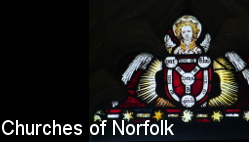
home I index I latest I glossary I introductions I e-mail I about this site
All Saints, East Barsham
Follow these journeys as they happen at Last Of England Twitter.
All Saints, East Barsham Few Norfolk churches
are as memorable as East Barsham's. It is a smallish,
rather ramshackle building in a wild churchyard, nothing
dramatic about it at all, and yet, and yet... We are in
the orbit of Walsingham here which spills its numinous
magic all around, and on a sunny day at any time of the
year the setting of the church beside the splendours of
the 16th Century Barsham Manor House is, as Mortlock
observed, breathtaking... making a trip to East
Barsham a 'must' for tourers in Norfolk. Pevsner was
equally bowled over by the Manor House, observing that it
still seems too good to be true when one first sets eyes
on it. There is no real village here, but the church
may be familiar to many people because it sits on the old
road from Fakenham to Walsingham, a mile or so south of
Houghton St Giles where the Catholic National Shrine of
Our Lady is. It will be familiar if they know it is
there, that is. All Saints huddles organically below the
road, hiding among the blue alkanet in late spring,
overshadowed by trees. You might easily pass it and think
it a ruin. Indeed, while gazing in wonder at the manor
house or pausing for a pint at the adjacent White Horse
pub you might not easily notice the church at all. You enter a spacious rectangular church under an impressively primitive roof. The feel of the organic persists inside, a smell of earth and damp. There is plenty of light from those big Perpendicular windows, but the light creates shadows, and in the glass of the windows some lovely 15th Century glass. The Blessed Virgin and St Elizabeth meet at the Visitation, flanked by two angel musicians playing a shawm and a harp. A curious circular fragment creates the illusion of a late medieval face peeping into the church. On the south side of the sanctuary is an impressive memorial of the 1640s by the Christmas Brothers in the 'Resurrection' style popular at that time. It is to Mary Calthorpe. The Calthorpes, who we have met on the other side of the Stiffkey at North Creake and Burnham Thorpe, lived at Barsham Manor in the 1640s. Mary Calthorpe climbs out of her coffin, although she does look disconcertingly as if she might be sitting in the bath, on the side of which is inscribed COME LORD JESU, COME QUICKLY. Angels wait with crowns for her in the alcove above, while at the top is the angel who started it all by blowing the last trump, his banner reading Arise and come to Judgement. As you'd expect around here, this is a church militantly in the orthodox Anglo-Catholic tradition, and in common with others it has some survivals brought here from elsewhere. The rood group in a blocked window splay on the north side came from the now-closed Tatterford Seminary on the other side of Fakenham. Tatterford was once one of the stars in the Anglo-Catholic firmament, a stopping place on the way to Walsingham and, in the 1930s, the parish of Father David Hand, who opened a school there for boys without a university education seeking a vocation to the priesthood. From Tatterford the boys went to Mirfield Theological College to train for holy orders. Dozens of boys from Tatterford went on to become priests, among them some local north Norfolk boys. However, the goings on at Tatterford were not approved of by the Bishop of Norwich, and the school finally closed in the 1940s. Probably from about the same time is the reredos, very much in the Walsingham style, vaguely naive and yet somehow triumphalist at the same time. Six saints flank the Blessed Virgin and Christchild. St George looks martial, St Monica demur, and then there are St Edmund with his arrows, St Margaret with her dragon, Julian of Norwich with her Revelations of Divine Love, and lastly St Augustine. I don't know if it was made for the church, and perhaps installed when it was rescued from dereliction after the Second World War, or if it was brought here from elsewhere. On this day in April 2022 it looked very fine with the altar dressed for Easter beneath it. Simon Knott, May 2022 Follow these journeys as they happen at Last Of England Twitter. |
|
|||||||||||||||||||||||||||||||||||||||||||||||||||||||
home I index I latest I introductions I e-mail I about
this site I glossary
Norwich I ruined churches I desktop backgrounds I round tower churches
links I small
print I www.simonknott.co.uk I www.suffolkchurches.co.uk